

Harlem
 Go Back - Latest New York City > USA > Americas > World | YouTube : Facebook | About Me : Contact Me
Go Back - Latest New York City > USA > Americas > World | YouTube : Facebook | About Me : Contact Me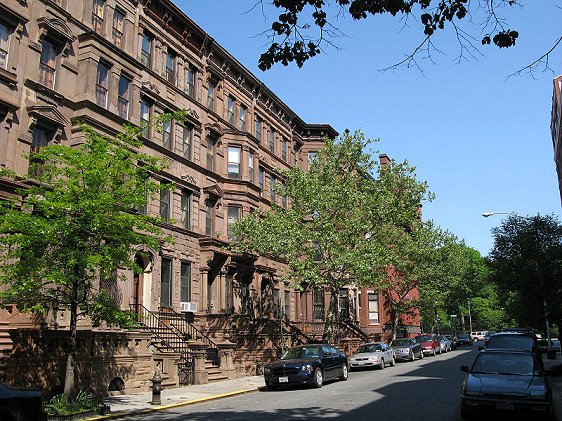 Harlem, New York City
Harlem, New York CitySource: https://commons.wikimedia.org/wiki/File:Harlem_01.jpg
Author: Momos

Since the turn of the 20th century, Harlem has become a predominantly African-American neighborhood. This is especially true in the 1920s and 30s. The area experienced a high rate of crime and poverty following the Second World War, when New York City on the whole experienced deindustrialization, as manufacturing jobs moved to other less expensive location. The area has however experienced an upswing following New York City's revival towards the end of the 20th century, and this has translated in the gentrification of some parts of Harlem.
Harlem covers 3.871 sq mi (10 sq km) and has a population of 216,000 (2011 estimate). The area defined as Harlem is bordered by the Harlem River and East River to the east and the Hudson River to the west. It is south of 155th Street, with Washington Heights to the north. The southern part of Harlem is bordered by Washington Heights (at Martin Luther King Jr. Boulevard), Central Park (at Central Park North), and the Upper East Side (at 96th Street).
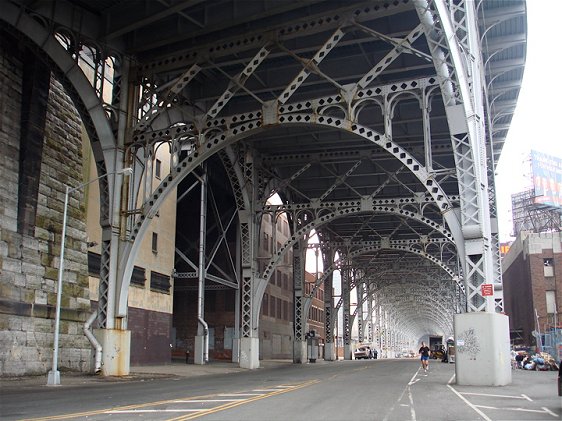 Riverside Drive Viaduct, Harlem
Riverside Drive Viaduct, HarlemSource: https://commons.wikimedia.org/wiki/File:Harlem_viaduct.jpg
Author: MR. 119TH STREET

Harlem itself comprises East Harlem, Central Harlem and West Harlem, and each of these are subdivided smaller neighborhoods and districts.
Places in East Harlem
East Harlem is located north of Upper East Side. It is also called Spanish Harlem, El Barrio and Italian Harlem. This area has the largest Latino community in New York City. The main group are people of Puerto Rican descent, with substantial populations of Latin Americans and African Americans. It is bordered by the Harlem River to the north, the East River to the east, East 96th Street to the south, and 5th Avenue to the west.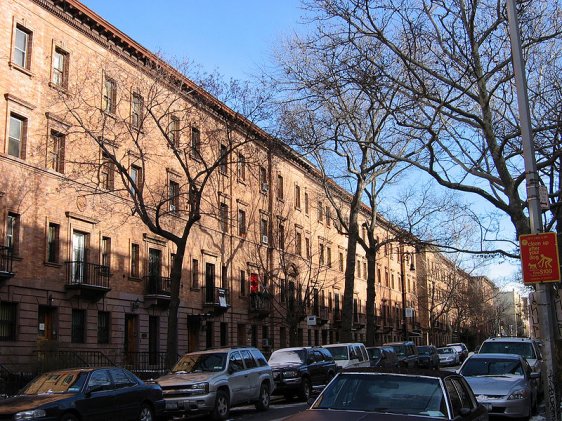 Strivers Row, Harlem
Strivers Row, HarlemSource: https://commons.wikimedia.org/wiki/File:Harlem_strivers_row.jpg
Author: Kmf164

Places in Central Harlem
Central Harlem is bounded by 110th Street, St. Nicholas Avenue, 155th Street and 5th Avenue.- Astor Row
Semi-attached row houses on the south side of 130th Street, among the first speculative townhouses built in Harlem. - Strivers' Row
Neighborhood of three rows of townhouses in western Harlem for upper middle class whites, and constructed between 1891 and 1893.
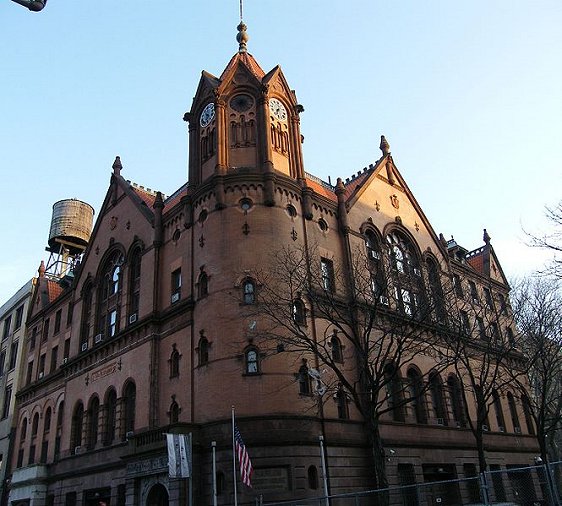 Harlem Courthouse, listed on the National Register of Historic Places
Harlem Courthouse, listed on the National Register of Historic PlacesSource: https://commons.wikimedia.org/wiki/File:Harlem-courthouse-170e121.jpg
Author: Americasroof

Places in West Harlem
West Harlem is located north of Upper West Side. It is bordered by St Nicholas Avenue, 123rd Street, the Hudson River and 155th Street.- Hamilton Heights
Neighborhood between Manhattanville to the south and Washington Heights to the north, and includes Sugar Hill. - Manhattanville
Neighborhood to the north of Morningside Heights, bounded by the Hudson River, Hamilton Heights and Central Harlem.
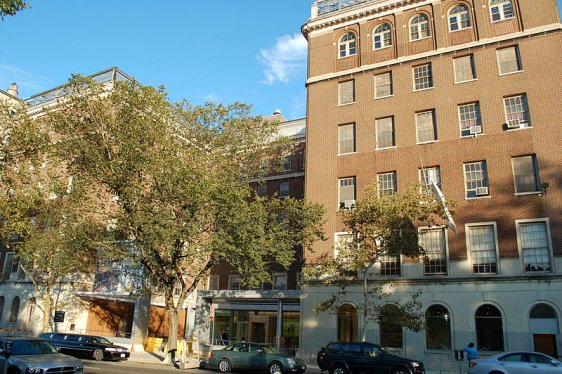 El Museo del Barrio, Harlem
El Museo del Barrio, HarlemSource: https://commons.wikimedia.org/wiki/File:WTM3_The_Fixers_0056.jpg
Author: The Fixers

Places of Interest to visit in Harlem
- Abyssinian Baptist Church
One of the most famous activist churches in Harlem. - Adam Clayton Powell Jr State Office Building
High-rise office building named after the first African-American to be elected to Congress from New York. - Apollo Theater
A famous music hall in Harlem, with almost exclusively Black performers. - Arthur Schomburg Center for Research in Black Culture
Research center and archive of information on people of African descent worldwide. - Blockhouse
A small fort on the northern part of Central Park, the oldest structure in the park. - City College of New York
The oldest of the City University of New York's 23 institutions of higher learning. - Cotton Club
Famous night club in Harlem. - Duke Ellington Circle
Traffic circle to the northeast corner of Central Park. - Dunbar Apartments
1926 housing project by John D Rockefeller Jr to provide housing for African Americans. - El Museo del Barrio
Museum showcasing the Latino culture of East Harlem. - Frederick Douglass Circle
Traffic circle on the northwest corner of Central Park. - Graham Court
Historic apartment block in Harlem commissioned by William Waldorf Astor. - Hamilton Grange National Memorial
Site preserving the early 19th century home of Alexander Hamilton, one of the Founding Fathers of the country. - Harbor Conservatory for the Performing Arts
Performing arts center in Spanish Harlem. - Harlem Children's Zone
Non-profit organization to help poverty-stricken children and families in Harlem. - Harlem Hospital Center
Teaching hospital in Harlem. - Harlem School of the Arts (HSA)
Art school for students of all ages. - Harlem YMCA
Notable YMCA and landmark in Harlem. - Hotel Theresa
Hotel built in 1913 that was a center of black life in Harlem. - James Bailey House
Castle-like house at 10 St Nicholas Place, built in 1886-88 for James Bailey of the Barnum & Bailey Circus. - Jumel Terrace Historic District
A row of 49 residential houses built between 1882 and 1909. It includes the Morris-Jumel Mansion. - La Marqueta
Marketplace under the Metro North railway tracks. - Langston Hughes House
Italianate style house built in 1869. - Lenox Lounge
Bar founded in 1939 on Lenox Avenue in Harlem. - Manhattan Avenue-West 120th-123rd Streets Historic District
District with 113 historic rowhouses built between 1886 and 1893. - Mink Building
5-story red brick structure in the German-American style built in 1905. - Minton's Playhouse
Jazz club on the first floor of the Cecil Hotel founded by Henry Minton in 1938. - Morningside Park
30-acre (12 hectare) public park at the border between Harlem and Morningside Heights. - Morris-Jumel Mansion
Built in 1765, this is the oldest house in Manhattan. - Mount Morris Park Historic District
16-block district in east central Harlem with houses built in the late 19th and early 20th century. - Museum of the City of New York
Art gallery and history museum showcasing paintings, drawings, and other items related to New York City. - New York College of Podiatric Medicine
The first podiatric medical school in the United States. - Riverside Drive Viaduct
Viaduct built in 1900 in Harlem. - Rucker Park
Basketball court in Harlem that has produced many NBA players. - Savoy Ballroom
Medium-sized ballroom and popular dance venue in Harlem. - St. Nicholas Historic District
District comprising 130 buildings designed in 1891 in Harlem. - Studio Museum in Harlem
An American contemporary art museum, the first devoted to the art of African-Americans. - Sylvia's Restaurant of Harlem
Also called Sylvia's Soul Food, this is a soul food restaurant founded in 1962 by Sylvia Woods. - West 147th-149th Streets Historic District
District with 60 historic buildings including a school and a stable, built between 1894 and 1905.
 Latest updates on Penang Travel Tips
Latest updates on Penang Travel Tips
About this website

Thanks for reading this page. My name is Timothy Tye. My hobby is to research information about places, and share the information with people on this website. I started this website on 5 January 2003, and since then, have written about over 20,000 places, mostly in Malaysia and Singapore.
Please use the information on this page as guidance only. While I try my best to provide you information that is as accurate as I can get it to be, I do apologize for any errors. Also, as I might not be able to update some information on time, some of these pages may contain outdated information.
Copyright © 2003-2024 Timothy Tye. All Rights Reserved.